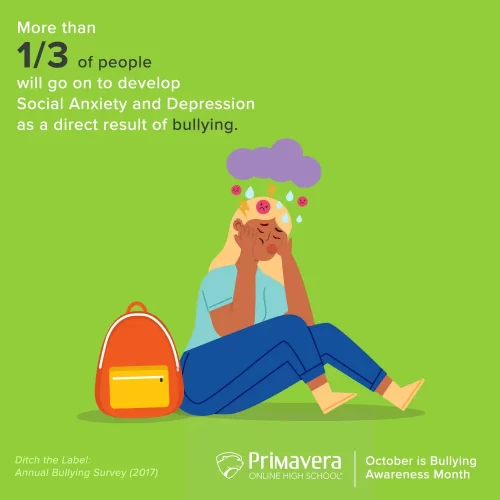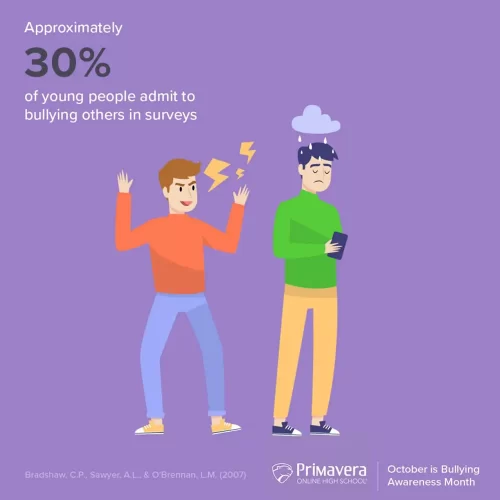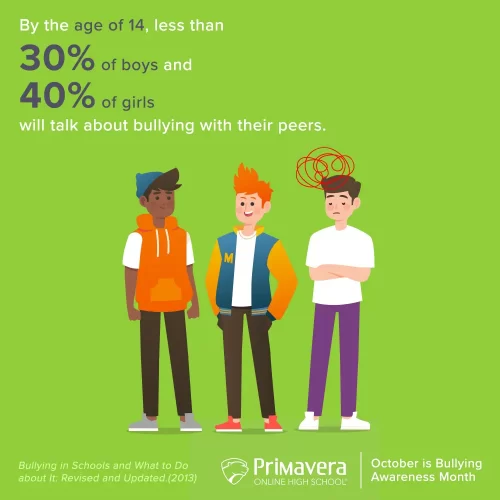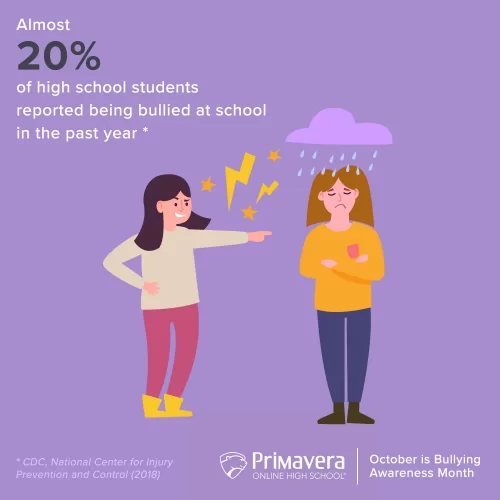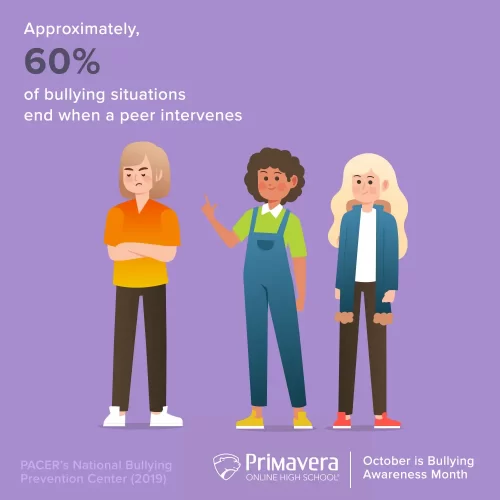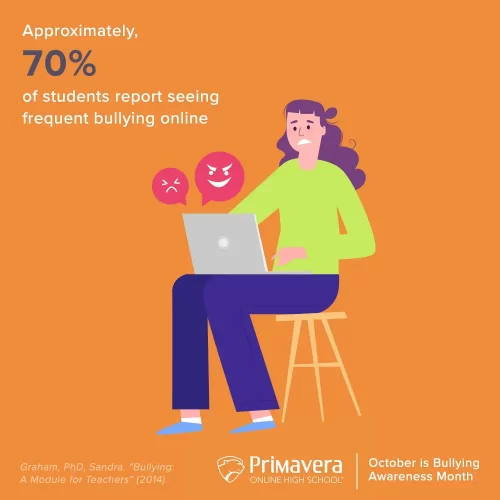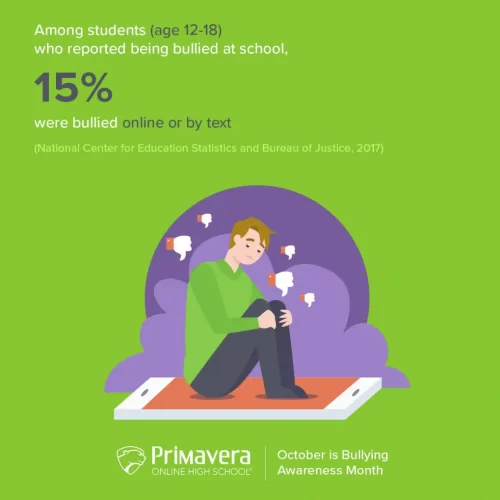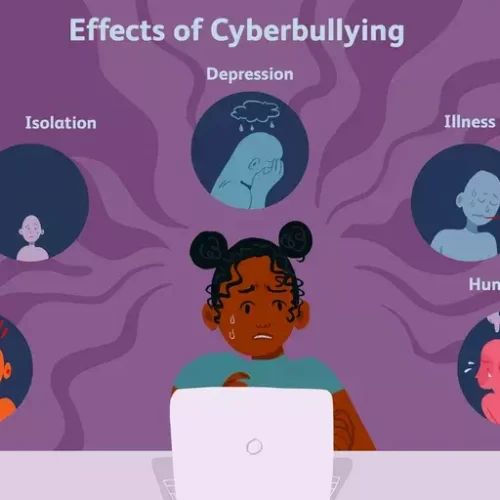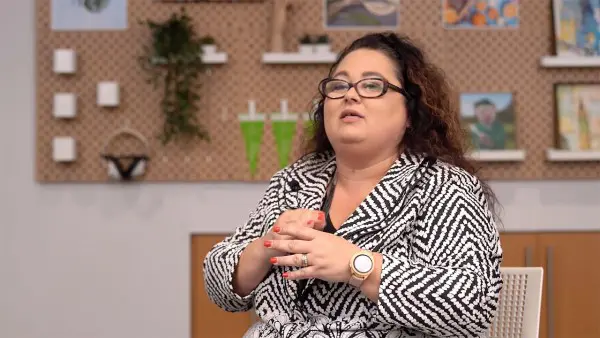Creating a healthy learning environment.
Every day, the admissions team and guidance counselors at Primavera speak with students that have been the victims of bullying. As your teachers and administrators, we empathize with your experience and we would like to share the resources that are available to you as students at Primavera.
The issue of bullying is close to the heart of Primavera and by sharing the experiences of teachers, administrators, and your fellow students we can continue to build a healthy environment for students to thrive.
Stats and Facts
Bullying is not limited to specific groups or individuals but affects a majority of our student population. The Center for Disease control defines bullying as the unwanted aggressive behavior(s) by another youth or group of youths, who are not siblings or current dating partners, that involves an observed or perceived power imbalance and is repeated multiple times or is highly likely to be repeated. Bullying may inflict harm or distress on the targeted youth including physical, psychological, social, or educational harm.[1]
Different Forms of Bullying
Exclusion
Purposefully leaving someone out or threatening to “break-up,” using the friendship as a weapon.
Silent Treatment
Silent Treatment. Signaling “our friendship might be over” or “you’re not worth talking to”.
Verbal Put-downs
Verbal put-downs like using sarcasm to be mean, teasing, calling someone mean names, making repeated abusive phone calls, and using phrases after criticism like “can’t you take a joke?” or “Just kidding.”
Gossip & Rumors
Gossip & Rumors. Stories or information spread behind their back (including about being promiscuous) can end up damaging reputations and destroying relationships.
Body Language
Body language like eye rolling, noises (“ew!”), mean looks, or staring that signals “I hate you.”
Social Media Abuse
Hurtful or damaging texts or posts on Facebook, Snapchat, Twitter, or Instagram, even if they end with “jk” or “lol.”
Facts about Bullying
- Bullying victims are 2 to 9 times more likely to consider dying by suicide.
- Over 30% of children who suffer a food allergy report having been bullied at school.
- It is a myth that bullying will most likely go away when it is ignored. Ignoring bullies reinforces to them that they can bully without consequence.
- Gay teens are three times more likely than heterosexual teens to report having been bullied. In contrast, gay teens were about 80% less likely than heterosexuals to say they had bullied someone else.
- Many adults who were bullying victims report that over time, feelings of unhappiness and shame decreased. However, those who remembered bullying as intensely painful continued to show low self-esteem, depression, pathological perfection, and greater neuroticism.
- If a school district does not take reasonable and appropriate steps to stop a child from being bullied, the district may be violating federal, state, and local laws. For more information, parents can contact the U.S. Department of Education Office or the U.S. Department of Education Office of Special Education Programs.
- Research by Fight Crime/Invest in Kids reports that 60% of boys who bullied from first grade through ninth grade were convicted of at least one crime by age 24 and 40% had three or more convictions by age 24.
- Researchers note that if a victim fights a bully and the bully wins, this loss will only make matters worse for the victim. Consequently, researchers argue that fighting back should not be encouraged. Instead, the child should be encouraged to walk away and tell an adult if he feels someone is about to hurt him.
Facts about Cyberbullying
- 21% of teens have been victims of cyberbullying at least once in their life.
- 19% of teens have cyberbullied others at least once in their life.
- The average cyberbully starts at age 9.
- 13% of teens said they had an experience on a social network that made them feel nervous about going to school the next day.
- 88% of teens using social media have witnessed someone being mean or cruel on a social networking site.
- Teens who spend more than 3 hours per day on social networks are 110% more likely to be cyberbullied.
- Only 7% of U.S. parents are worried about cyberbullying.
Resources
As students at Primavera Online School you have access to a team of certified guidance counselors and paraprofessionals that can offer personal support. Students can reach the guidance department’s general reception line Monday through Friday from 8 a.m. to 5 p.m. at (480) 405-2714.
For Students:
Students can also find the contact information for their own guidance counselor on the Parent Student Portal.
If you or someone you know is experiencing a crisis, please call Crisis Response Network or text HOME to 741741. This organization is an Arizona non-profit dedicated to helping individuals and families get connected to the help they need. You can also find additional resources on our Student Support and Guidance page.
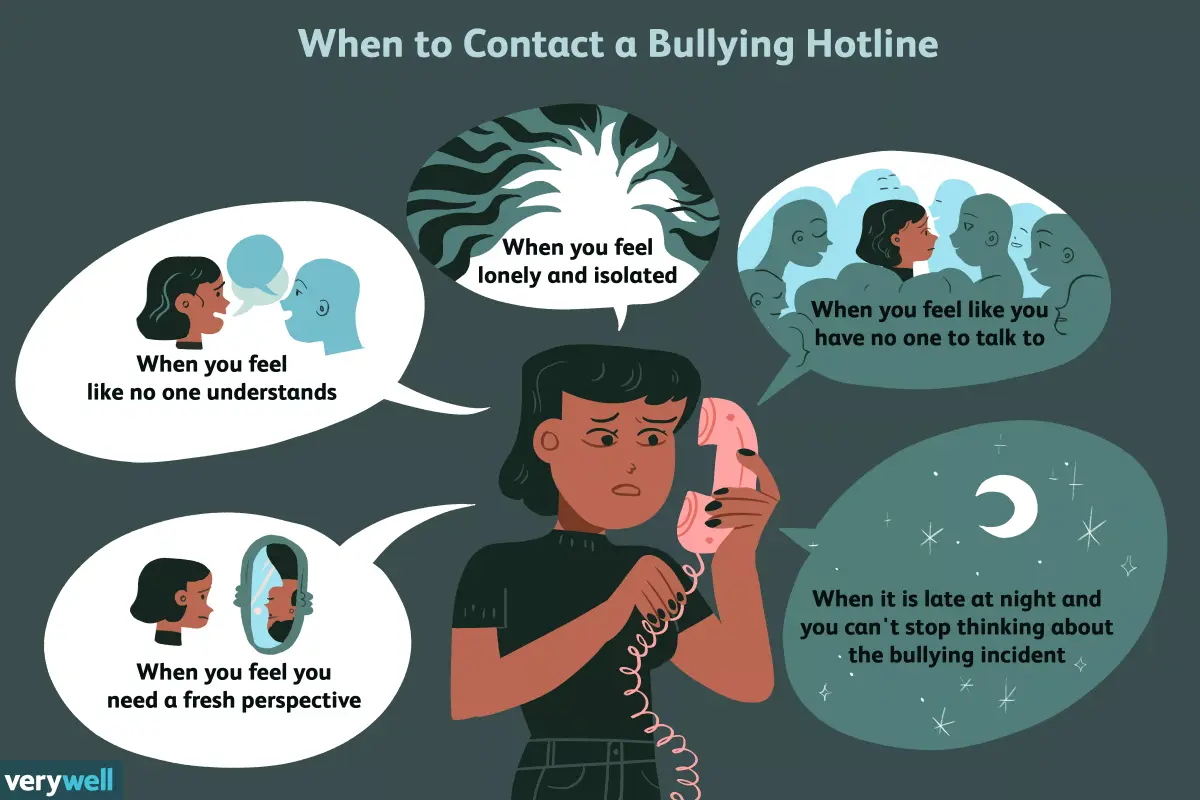
For Educators:
- https://assets.ctfassets.net/98bcvzcrxclo/572krvYG2sugMcscwcioe8/389eafdbee237954b507f5560e85d2a7/SEL_Bullying_Paper.pdf
- http://www.nea.org/tools/lessons/teaching-students-to-prevent-bullying.html
- https://www.teacher.org/resource/bullying/
- https://www.pacer.org/bullying/classroom/middle-highschool/
- https://www.nasponline.org/Documents/Resources%20and%20Publications/Handouts/Safety%20and%20Crisis/Supporting%20students%20experiencing%20bullying_2019_Final.pdf
For Parents:
- https://www.cfchildren.org/resources/bullying-prevention-resources/
- https://www.pacer.org/bullying/resources/parents/
- http://www.violencepreventionworks.org/public/bullying_tips_for_parents.page
- http://www.thebullyproject.com/parents
- https://pacerteensagainstbullying.org/bullying-defined/common-views/

